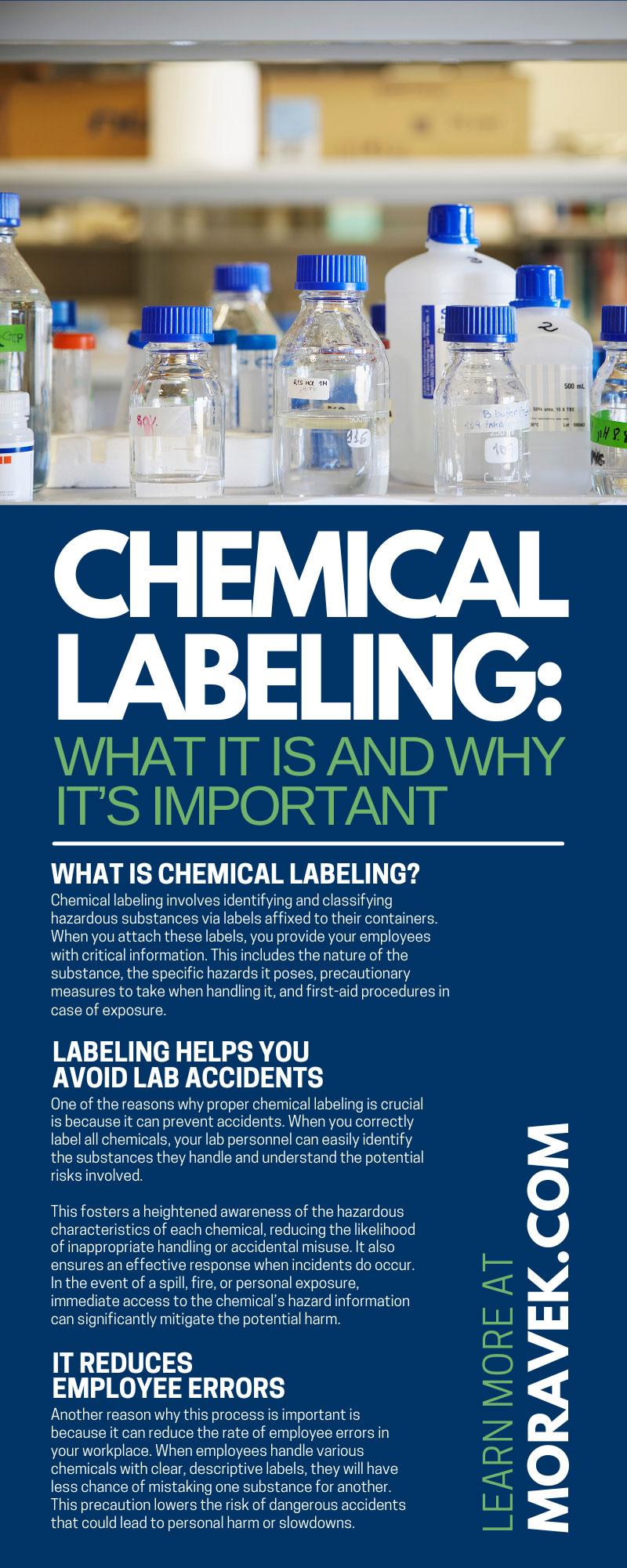
When your employees use chemicals in your laboratory, you need to ensure they use the right substances for the right processes. But that’s where the process of chemical labeling can be helpful for your business. Read on to learn about what chemical labeling is and why it’s important for both your lab and the safety of your associates as they conduct their research.
What Is Chemical Labeling?
Chemical labeling involves identifying and classifying hazardous substances via labels affixed to their containers. When you attach these labels, you provide your employees with critical information. This includes the nature of the substance, the specific hazards it poses, precautionary measures to take when handling it, and first-aid procedures in case of exposure. Typically, you can communicate this information through universally understood standardized pictograms, signal words, hazard statements, and precautionary statements.
Underpinning chemical labeling is a global system known as the Globally Harmonized System (GHS) of Classification and Labeling of Chemicals. Adopted by many countries, the GHS provides a consistent framework for the classification of chemicals based on their health, physical, and environmental hazards.
Why Is Chemical Labeling Important?
Now that you know what chemical labeling is, we can explain why it’s important. There are several reasons why you should implement chemical labeling in your laboratory, which you can find below.
Labeling Helps You Avoid Lab Accidents
One of the reasons why proper chemical labeling is crucial is because it can prevent accidents. When you correctly label all chemicals, your lab personnel can easily identify the substances they handle and understand the potential risks involved.
This fosters a heightened awareness of the hazardous characteristics of each chemical, reducing the likelihood of inappropriate handling or accidental misuse. It also ensures an effective response when incidents do occur. In the event of a spill, fire, or personal exposure, immediate access to the chemical’s hazard information can significantly mitigate the potential harm.
It allows for the prompt implementation of the appropriate emergency response procedures, personal protective equipment, and cleanup methods. Thus, chemical labeling serves as a vital tool in both accident prevention and crisis management.
It Reduces Employee Errors
Another reason why this process is important is because it can reduce the rate of employee errors in your workplace. When employees handle various chemicals with clear, descriptive labels, they will have less chance of mistaking one substance for another. This precaution lowers the risk of dangerous accidents that could lead to personal harm or slowdowns.
Having clear labels can also ensure that your product quality stays high, as employees will make fewer errors. That will better ensure that your clients stay satisfied while your business continues to prosper.
Chemical Labels Tell You Who Made the Product
Chemical labels can also be a valuable source of information if your laboratory needs to trace the origins of a product. Each label should include the manufacturer’s name, address, and contact information, thereby providing transparency about the product’s source.
This information is particularly crucial in the event of a safety issue or a recall, where users need to contact the manufacturer for further instructions or clarifications. Moreover, it allows regulatory bodies to make producers responsible for their products. This promotes a culture of responsibility and compliance within the industry.
Knowing the manufacturer of a chemical could also be helpful if you need to understand its composition and potential risks. Different manufacturers might use slightly different processes or raw materials, leading to variations in the properties of their products. Being able to link a substance back to its producer allows users to access more specific information about the product, including any proprietary safety data.
They Help You Protect Your Property
Chemical labels can also play a part in safeguarding your property. If your workers used products that did not have proper labels, it could result in accidents that could be dangerous to your workers and your work environment. That could result in you paying a significant sum of money to repair the damage.
But you can avoid this damage when workers see the information detailed on labels, such as warnings against certain combinations that could lead to dangerous reactions. You can protect your property and financial investments by putting labels on your chemicals.
Labels Ensure Your Lab Follows OSHA Regulations
Chemical labeling isn’t just a matter of best practice but also a legal requirement. OSHA, the Occupational Safety and Health Administration, demands the labeling of all containers of hazardous chemicals in the workplace under its Hazardous Communication Standard. This mandate requires you to present specific information in a consistent and comprehensive manner. OSHA’s alignment with the GHS enhances the clarity and universality of chemical information, which promotes safer handling and use of hazardous substances.
Non-compliance with OSHA’s labeling requirements can result in substantial penalties and legal repercussions for businesses. By following OSHA’s regulations, labs can ensure they remain compliant and avoid these consequences while protecting their teams from potential harm.
They Tell Employees How To Store the Chemicals
Chemical labels often contain crucial information about the proper storage conditions of a substance. This may include temperature requirements, whether you must keep the substance away from light or certain chemicals, and any specific containment needs. By adhering to the storage instructions on chemical labels, employees can prevent the degradation of substances, avoid dangerous reactions, and maintain the integrity of the chemical for future use.
Furthermore, proper storage of chemicals as directed by the labels contributes to an organized and efficient workplace. When your employees store substances correctly, they can locate and access them much more quickly, reducing time wasted on unnecessary searches. This also minimizes the risk of accidental spills or mishandling of chemicals. Hence, proper storage instructions can both enhance safety and improve operational efficiency.
As these examples have shown, chemical labeling plays a pivotal role in industries that deal with potentially hazardous substances. Such practices can be beneficial when working with deuterium-labeled compounds from Moravek. Our company has provided a wide range of compounds and custom organic synthesis services to our many satisfied customers.

